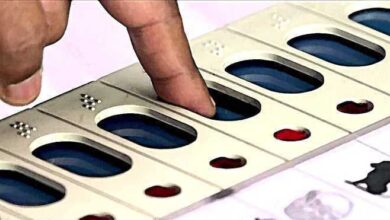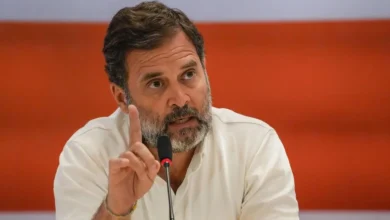Sweeping precautions for the farmer march cause havoc in Delhi, and many object to the excessive detail
On Tuesday, when the authorities went beyond and enforced prohibitory orders to limit travel and public meetings, traffic mayhem in Delhi was caused by sweeping security precautions put in place to prevent a march of farmers from Punjab, Haryana, and Uttar Pradesh to the Capital.

At least eight metro stations have restrictions in place, with one or more gates closed to regulate the flow of passengers, according to the Delhi Metro Rail Corporation (DMRC), which cited directives from the Delhi Police.
Some of the metro stations with closed gates were Rajiv Chowk, Mandi House, Central Secretariat, Patel Chowk, Udyog Bhawan, Janpath, Khan Market, and Barakhamba Road.
Longer lines at stations, according to passengers, led to mayhem, especially during business hours. While gate number five was open on the other side of the street, gate number six at the Barakhambha Metro Station has been closed and barriers installed. People are being asked to leave, but doing so always requires them to cross the road again, which exacerbates traffic jams, according to Jyoti Verma, a private firm employee on Barakhamba Road.
Due to barriers on major thoroughfares, traffic in several areas of Delhi completely stopped during the morning commute. Heavy traffic was observed at the main border crossings with Gurugram and Noida.
In downtown Delhi, pickets obstructed traffic in many locations, including Golf Links, Archbishop Makarios Marg, ITO, Barakhamba Road, Africa Avenue, and Vinay Marg.
Social media was used by commuters to voice their displeasure with the excessive measures implemented. A passenger named Vinod Kabdi commented on social media, saying, “If you’re stuck in traffic in Delhi NCR, open your eyes and look around.” There won’t be any farmers obstructing traffic. The route will be blocked by cops, as you will witness.
At the Singhu flyover, Delhi Police erected roadblocks from the Kundli side, enabling traffic to flow in one lane on each roadway. There is hardly enough space for one car to pass. One car at a time may now cross the flyover on both carriageways, but a decision will be made in real-time if and when the demonstrators arrive, according to a traffic police official.
A 25-year-old guy said he was running late as he traveled from Haryana to Delhi for a postgraduate teachers’ test. “I need to get to the center by noon, but the bus isn’t moving at 11:55 a.m.,” he said.
At the Singhu border, up to twenty companies of security troops were present. Haryana-based commuters had to deal with up to an hour-long traffic jam.
On Tuesday afternoon, the farmers were to gather at the border crossings at Singhu, Tikri, and Ghazipur in the Capital. Prior to the march, trenches, concertina wires, shipping containers, and metal barricades were positioned around Delhi’s periphery.
Around midnight, farm leaders concluded their meeting with Union officials and declared that the protest would go on.
Traffic gridlocks extended to major thoroughfares around the city. The Delhi Police alerted commuters to the possibility of traffic diversions “may be required at Singhu, Ghazipur, and Tikri borders depending on the conditions” in an updated traffic warning on Monday night.
“Traffic restrictions and diversions will be imposed at Singhu, Tikri, and Ghazipur borders starting on February 12 for commercial vehicles and starting on February 13 for all types of vehicles,” according to an earlier advice.
At the borders were more than fifty Delhi Police and paramilitary companies, each with advanced weaponry, bulletproof jackets, batons, helmets, and tear gas launchers and shells. Additionally, drones were used over the outskirts of the city.
A complex network of obstacles, including iron barricades, jersey barriers, shipping containers, barbed wire fencing, iron nails, hydra cranes, buses, and other vehicles, was erected at the borders to prevent the farmers who were protesting from reaching Delhi.
Every police station in the city was alerted, and officers were urged to step up car inspections, patrols, and police pickets.
On Monday, the police erected checkpoints in the heart of Delhi. At the Mandi House, ITO, Minto Bridge, Mathura Road, Ring Road, Ranjit Singh flyover, and Minto Bridge, vehicles were inspected.
As negotiations between Union ministers Piyush Goyal and Arjun Munda and the leaders of the protesting farmer groups in Punjab came to a standstill, preparations were made. The two parties’ first meeting, which took place on February 8, likewise ended in a deadlock.
Farmer leaders in Punjab and Haryana accused the government of attempting to gain time while they reinforced their borders with barbed wire, iron nails, and concrete blocks to stop the planned march.
In fifteen districts, the Haryana government has enforced bans on gatherings of five or more individuals, as well as on using tractor-trolleys for demonstrations or marches.
On Monday, farmers connected to 200 organizations and unions disobeyed restrictions by setting out on tractors and vehicles on their way to Delhi. Authorities had to send out paramilitary and police troops to stop farmers from marching to Delhi after some protestors drove their cars into barriers.
The farmers want employment for the families of those slain during the 13-month-long farmers’ protest between November 2020 and December 2021, as well as minimum support prices for their crops and waivers on farm debts. They also want the proceedings against the protesting farmers to be dropped and compensation for the farmers who were hurt in Lakhimpur Kheri.
In October 2021, four farmers who were protesting were put to death in Lakhimpur Kheri. Minister of the Union Ajay Kumar Mishra Ashish Mishra, Teni’s son, is the main suspect in the mowing.
On Monday, the Delhi Police decided to add another month to the ban on public meetings and travel around the nation’s capital. Previously, only the east, northeast, outer-north, and outside police districts had the prohibition orders in effect.
Cultivators staged one of the largest protests in years in 2020–21, which forced the government to revoke three legislation established in September 2020 to reform agriculture.
For over 14 months, tens of thousands of farmers who were against the legislation camped out on state roads. They disregarded the government’s assertion that the rules would help them by giving them better access to markets and instead effectively established protest townships at five locations, including Ghazipur, Singhu, and Tikri. They also obstructed traffic. The legislation, according to farm groups, would put growers at the whim of businesses.
By taking preventative action to stop the demonstrators from entering the Capital, security personnel have attempted to stop a repeat of the agitations.







